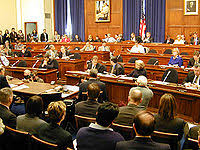
Today, the U.S. House Committee on Financial Services held an oversight hearing titled “Overseeing the Standard Setters: An Examination of the Financial Accounting Standards Board and the Public Company Accounting Oversight Board.”
We urge the Committee to conduct a follow-up hearing. This would cover the Governmental Accounting Standards Board (GASB) and the Federal Accounting Standards Advisory Board (FASAB).
There aren’t many people in the United States aware that there is not only one set of accounting standards in the US. There are at least four main sources:
The Financial Accounting Foundation (FAF) is a private, nonprofit organization overseeing the Financial Accounting Standards Board (FASB) as well as GASB, both of which are under the FAF umbrella.
FASB standards are for private sector organizations.
GASB issues different standards for state and local governments.
FASAB issues different standards for the federal government.
And the fourth main accounting standard setter is the answer to the trivia question “Who sets the accounting standards for the Federal Reserve Banks?” (The answer is – the Federal Reserve Board of Governors).
GASB and FASAB, as well as the Federal Reserve, also deserve scrutiny, not just FASB. Showing you oversee FASB may help the Congress show it cares about investors, but oversight of GASB and FASAB could indicate they care about taxpayers and citizens, as well.
The House Financial Services Committee is currently chaired by Rep. Maxine Waters (D-California). The Vice-Chair is Rep. Michael San Nicolas of Guam, another financially challenged jurisdiction. The ranking member is Rep. Patrick McHenry (North Carolina).
There are more than 50 members on the Committee. And speaking of financially challenged jurisdictions, we note that, on a weighted average basis, the states from which the members of the House Financial Services Committee come have a weighted average Taxpayer Burden of $14,000, as calculated by Truth in Accounting, much higher than the average for states that are not on the Committee.
Given that federal actions may turn financial issues in troubled states into national matters of interest – and of interest to relatively responsible jurisdictions -- perhaps representatives in other places might consider working harder to get on relevant House (and Senate) Committees.

